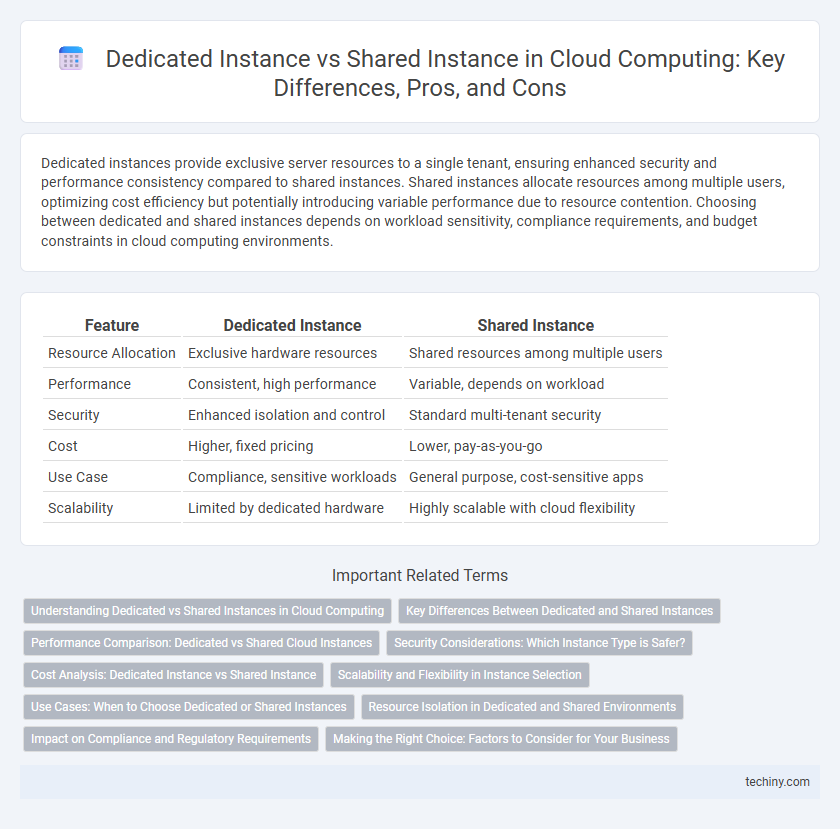Dedicated instances provide exclusive server resources to a single tenant, ensuring enhanced security and performance consistency compared to shared instances. Shared instances allocate resources among multiple users, optimizing cost efficiency but potentially introducing variable performance due to resource contention. Choosing between dedicated and shared instances depends on workload sensitivity, compliance requirements, and budget constraints in cloud computing environments.
Table of Comparison
| Feature | Dedicated Instance | Shared Instance |
|---|---|---|
| Resource Allocation | Exclusive hardware resources | Shared resources among multiple users |
| Performance | Consistent, high performance | Variable, depends on workload |
| Security | Enhanced isolation and control | Standard multi-tenant security |
| Cost | Higher, fixed pricing | Lower, pay-as-you-go |
| Use Case | Compliance, sensitive workloads | General purpose, cost-sensitive apps |
| Scalability | Limited by dedicated hardware | Highly scalable with cloud flexibility |
Understanding Dedicated vs Shared Instances in Cloud Computing
Dedicated instances in cloud computing provide isolated physical servers exclusively for a single tenant, enhancing security and performance by eliminating resource contention. Shared instances run multiple tenants on the same hardware, optimizing cost-efficiency but potentially introducing variability in performance and security risks. Choosing between dedicated and shared instances depends on workload requirements, compliance needs, and budget constraints.
Key Differences Between Dedicated and Shared Instances
Dedicated instances provide isolated hardware resources exclusively for a single tenant, ensuring enhanced security, performance consistency, and compliance control. Shared instances operate on multi-tenant infrastructure where resources are distributed among multiple users, which can reduce costs but may introduce variability in performance and potential security concerns. Key differences include isolation level, cost structure, resource allocation, and regulatory compliance capabilities.
Performance Comparison: Dedicated vs Shared Cloud Instances
Dedicated cloud instances provide isolated resources, ensuring consistent CPU, memory, and network performance ideal for high-demand applications. Shared cloud instances allocate resources across multiple tenants, potentially causing variable performance due to resource contention. The predictable and stable environment of dedicated instances often results in superior reliability and lower latency compared to shared instances.
Security Considerations: Which Instance Type is Safer?
Dedicated instances provide enhanced security by isolating workloads on physical hardware, minimizing the risk of cross-tenant attacks common in shared environments. Shared instances, while cost-effective, may expose data to vulnerabilities due to resource sharing between multiple clients. Enterprises with stringent compliance requirements typically prefer dedicated instances for stronger data protection and reduced attack surfaces.
Cost Analysis: Dedicated Instance vs Shared Instance
Dedicated instances typically incur higher costs due to exclusive hardware allocation, resulting in increased control and isolation but reduced resource sharing efficiencies. Shared instances leverage multi-tenancy, lowering expenses by distributing infrastructure costs among multiple users, which improves cost-effectiveness for smaller workloads or budget-conscious projects. Evaluating workload requirements and performance needs is essential to balance the cost implications of dedicated versus shared cloud computing instances.
Scalability and Flexibility in Instance Selection
Dedicated instances provide enhanced scalability by allowing organizations to customize resources exclusively to their workload demands, ensuring consistent performance without interference from other users. Shared instances offer greater flexibility in instance selection since users can choose from a wide range of instance types within a multi-tenant environment, enabling quick adaptation to changing application requirements and cost optimization. Scaling dedicated instances involves provisioning additional isolated resources, while shared instances leverage pooled infrastructure to dynamically allocate capacity based on demand fluctuations.
Use Cases: When to Choose Dedicated or Shared Instances
Dedicated instances are ideal for workloads requiring stringent compliance, enhanced security, or predictable performance, such as financial services or healthcare applications. Shared instances suit cost-sensitive projects with flexible security needs, like development environments, testing, or small-scale websites. Selecting dedicated or shared instances depends on factors like regulatory requirements, traffic consistency, and budget constraints.
Resource Isolation in Dedicated and Shared Environments
Dedicated instances offer complete resource isolation by allocating physical servers exclusively to a single tenant, ensuring no resource contention and enhanced security for critical workloads. Shared instances operate on multi-tenant infrastructure where CPU, memory, and storage resources are dynamically shared among multiple users, leading to potential variability in performance and increased risk of noisy neighbor effects. This resource isolation difference significantly impacts workload predictability, compliance requirements, and overall system reliability in cloud computing environments.
Impact on Compliance and Regulatory Requirements
Dedicated instances provide enhanced compliance and regulatory assurance by isolating workloads on physical servers, reducing the risk of data leakage and unauthorized access inherent in shared environments. Shared instances, while cost-effective, increase exposure to cross-tenant vulnerabilities, complicating adherence to strict frameworks like HIPAA, GDPR, or PCI DSS. Organizations with stringent data sovereignty and security mandates often prefer dedicated instances to maintain clear audit trails and meet industry-specific compliance standards.
Making the Right Choice: Factors to Consider for Your Business
Dedicated instances offer enhanced security, predictable performance, and compliance advantages by isolating resources exclusively for your business, making them ideal for sensitive workloads and regulatory requirements. Shared instances provide cost savings and scalability by pooling resources among multiple tenants but may introduce variability in performance and potential security concerns. Evaluate workload sensitivity, budget constraints, compliance mandates, and performance consistency needs to determine the optimal instance type for your cloud computing strategy.
dedicated instance vs shared instance Infographic

 techiny.com
techiny.com